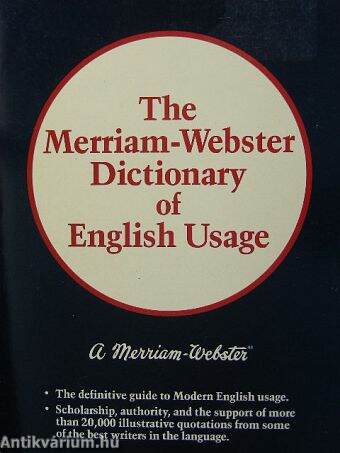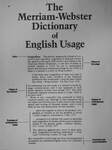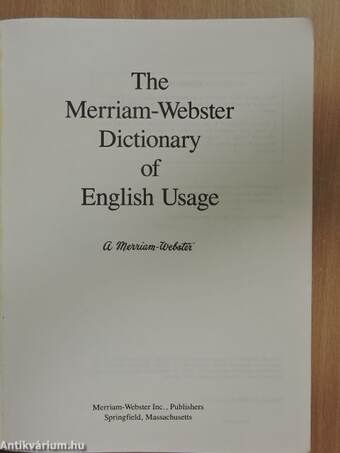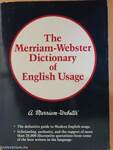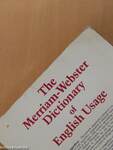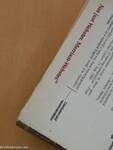1.117.798
kiadvánnyal nyújtjuk Magyarország legnagyobb antikvár könyv-kínálatát
The Merriam-Webster Dictionary of English Usage
Az angol nyelv használatának Merriam-Webster szótára
| Kiadó: | Merriam-Webster Inc., Publishers |
|---|---|
| Kiadás helye: | Springfield, Massach |
| Kiadás éve: | |
| Kötés típusa: | Ragasztott papírkötés |
| Oldalszám: | 978 oldal |
| Sorozatcím: | A Merriam-Webster |
| Kötetszám: | |
| Nyelv: | Angol |
| Méret: | 23 cm x 17 cm |
| ISBN: | |
naponta értesítjük a beérkező friss
kiadványokról
naponta értesítjük a beérkező friss
kiadványokról
Előszó
TovábbFülszöveg
The
Merriam-Webster Dictionary
of
English Usage
Entry-
History of the criticism ~
Examples of contemporary ~ usage
¦ irregardless This adverb, apparently a blend of irre- > spective and regardless, originated in dialectal American speech in the early 20th century (according to the American Dialect Dictionary, it was first recorded in western Indiana in 1912). Its use in nonstandard speech had become widespread enough by the 1920s to make it a natural in a story by Ring Lardner:
I told them that irregardless of what you read in books, they's some members of the theatrical profession that occasionally visits the place where they sleep —Ring Lardner, The Big Town, 1921
Its widespread use also made it a natural in books by usage commentators, and it has appeared in such books regularly at least since Krapp 1927. The most frequently repeated comment about it is that "there is no such word."
Word or not, irregardless has continued in fairly common spoken use, although its bad... Tovább
Fülszöveg
The
Merriam-Webster Dictionary
of
English Usage
Entry-
History of the criticism ~
Examples of contemporary ~ usage
¦ irregardless This adverb, apparently a blend of irre- > spective and regardless, originated in dialectal American speech in the early 20th century (according to the American Dialect Dictionary, it was first recorded in western Indiana in 1912). Its use in nonstandard speech had become widespread enough by the 1920s to make it a natural in a story by Ring Lardner:
I told them that irregardless of what you read in books, they's some members of the theatrical profession that occasionally visits the place where they sleep —Ring Lardner, The Big Town, 1921
Its widespread use also made it a natural in books by usage commentators, and it has appeared in such books regularly at least since Krapp 1927. The most frequently repeated comment about it is that "there is no such word."
Word or not, irregardless has continued in fairly common spoken use, although its bad reputation has not improved with the years. It does occur in the casual speech and writing of educated people, and it even finds its way into edited prose on rare occasion:
. . . allow the supplier to deliver his product, irregardless of whether or not his problem is solved —John Cosgrove, Datamation, 1 Dec. 1971
. . . irrespective of whether the source is identified and irregardless of whether all that news is disseminated to the general public —Robert Hanley, N.Y. Times, 25 Oct. 1977
The spherical agglomerates occur in these powders, irregardless of starting composition —Pred-icasts Technology Update, 25 Aug. 1984
But irregardless is still a long way from winning general acceptance as a standard English word. Use regardless instead.
. History of the usage
Analysis of
contemporary
usage
Conclusion and recommendation Vissza


